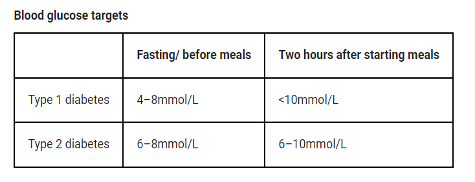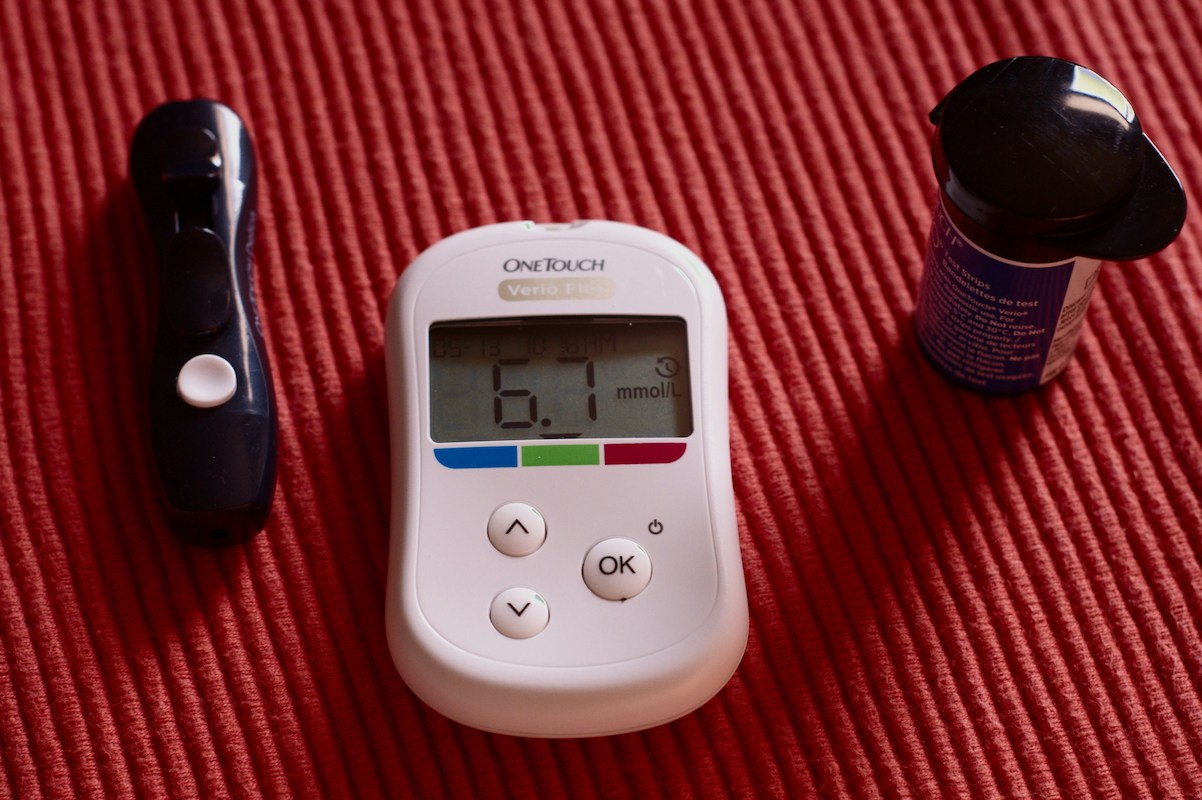About Diabetes
What is diabetes?
Diabetes is a health condition in which your body has difficulty converting glucose (a type of sugar) Into energy. This leads to high levels of sugar in the blood called Hyperglycaemia.
Blood sugar levels are normally controlled by a hormone called insulin, which converts sugar into energy. Diabetes occurs when the pancreas (a glandular organ located in the abdomen) can’t produce insulin or when your body can’t make use of the insulin because it’s grown resistant to it.
Types of diabetes
Type 1 diabetes
Type 1 diabetes occurs when a person’s own immune system breaks down the cells in the pancreas that produce insulin, resulting in little to no insulin being produced
Type 2 diabetes
Type 2 diabetes occurs when the body’s cells do not respond effectively to insulin or lose the ability to produce enough insulin in the pancreas. This causes sugar to stay in the blood, leading to a higher-than-normal level of glucose in the body.
Blood Glucose Targets
Your doctor or diabetes health care provider will determine what a reasonable blood sugar range is for you and set target blood sugar test results based on several factors, including:
- Type and severity of your diabetes
- How long you’ve lived with diabetes
- Your age
- Whether you are pregnant
- Any diabetes complications or other medical conditions
- Your overall health

Hyperglycaemia
A high blood sugar level, also called hyperglycaemia or a “hyper”, is where the level of sugar (glucose) in your blood becomes too high. A measurement of over 11mmol/L is usually considered a diagnosis of hyperglycaemia if the measurement is taken at any time or 7mmol/L if the test is done fasting.
Hypoglycaemia
A low blood sugar level, also called hypoglycaemia or a “hypo”, is where the level of sugar (glucose) in your blood drops too low. It mainly affects people with diabetes, especially if they take insulin. Hypoglycaemia occur when the blood glucose level has dropped too low, below 4mmol/L.
When should I see my doctor?
Diabetes is serious but can be managed well with a combination of medicines and lifestyle changes. Early diagnosis and treatment can also help to reduce the risk of more serious complications. Speak to your doctor if you are experiencing symptoms of diabetes or have concerns about your risk of diabetes.
Diabetes Risk Factors
The risk of getting type 2 diabetes increases with certain lifestyle factors:
- a family history of diabetes
- low levels of physical activity
- poor diet
- being obese or overweight
How is diabetes treated and managed?
Diabetes can be managed with lifestyle changes and medication.
Type 1 diabetes
If you have type 1 diabetes, you will need insulin replacement, through injections or an insulin pump. This helps control your body’s blood sugar levels. Your lifestyle choices after your diagnosis can reduce the risk of developing more serious complications such as kidney disease, eye damage and foot problems.
Type 2 diabetes
Type 2 diabetes can sometimes be initially managed by lifestyle changes, such as following a healthy diet and being physically active. Eventually, you may need to take medicines to manage sugar levels. Your doctor may prescribe tablets or injectable medicines (insulin or others) to help keep your blood sugar in the target range.
Managing Blood Sugar Levels
What causes blood glucose levels to go up or down?
There are many reasons why your blood glucose levels may go up or down during the day. The most common causes include:
- food (the time, type and amount of carbohydrate eaten)
- the amount of exercise or physical activity
- diabetes medication
- emotional stress/excitement
- hormonal changes
- blood glucose monitoring techniques
- illness and pain
- alcohol
- medications, such as steroids.
Are high blood glucose levels dangerous?
- Sometimes, your blood glucose levels may be high, and you may not understand why.
- If you have type 1 diabetes and your blood glucose levels are high, or if you are sick, it’s important to check for ketones (Ketones are a type of chemical that your liver produces when it breaks down fats) in your blood or urine. If you have ketones or are unwell, it’s important to seek medical attention.
- Long-term diabetes-related complications can occur if blood glucose levels are above the target range over a long period of time. If your blood glucose levels are high on a regular basis, ask your doctor or diabetes health professionals for advice.
How To Manage Diabetes
Keeping your blood sugar levels within the range recommended by your doctor can be challenging. That’s because many things make your blood sugar levels change, sometimes unexpectedly. Following are some factors that can affect your blood sugar levels.
Food
Healthy eating is a cornerstone of healthy living with or without diabetes. But if you have diabetes, you need to know how foods affect your blood sugar levels. It’s not only the type of food you eat, but also how much you eat and the combinations of food types you eat.
- Learn about carbohydrate counting and portion sizes
- Make every meal well balanced
- Coordinate your meals and medications
- Avoid sugar-sweetened beverages
Exercise
Physical activity is another important part of your diabetes management plan. When you exercise, your muscles use sugar (glucose) for energy. Regular physical activity also helps your body use insulin more efficiently. These factors work together to lower your blood sugar level. The more strenuous your workout, the longer the effect lasts. But even light activities — such as housework, gardening or being on your feet for extended periods — can improve your blood sugar.
Medication
Insulin and other diabetes medications are designed to lower your blood sugar levels when diet and exercise alone aren’t sufficient for managing diabetes. But the effectiveness of these medications depends on the timing and size of the dose. Medications you take for conditions other than diabetes also can affect your blood sugar levels.
Stress
If you’re stressed, the hormones your body produces in response to prolonged stress may cause a rise in your blood sugar level. Additionally, it may be harder to closely follow your usual diabetes management routine if you’re under a lot of extra pressure.
swara Health and Nutrition Program
swara runs an NDIS-funded Health and Nutrition Day Program designed to assist people to increase physical activity and encourage healthier eating. It is tailored to individual participants and includes diabetes education for participants diagnosed with the condition.
Our aim is to bring awareness so that participant with diabetes can have the correct tools to live a better-quality life. Some of the tools include equipping participants with the knowledge on healthy food choices, how to monitor sugar levels, and why physical activity is so important for them.
Our program aims to improve both physical and mental health as well as the quality of life and self-esteem in a welcoming environment. You can read more about the swara Health and Nutrition Day Program, (link) or contact the friendly swara team for more information.






